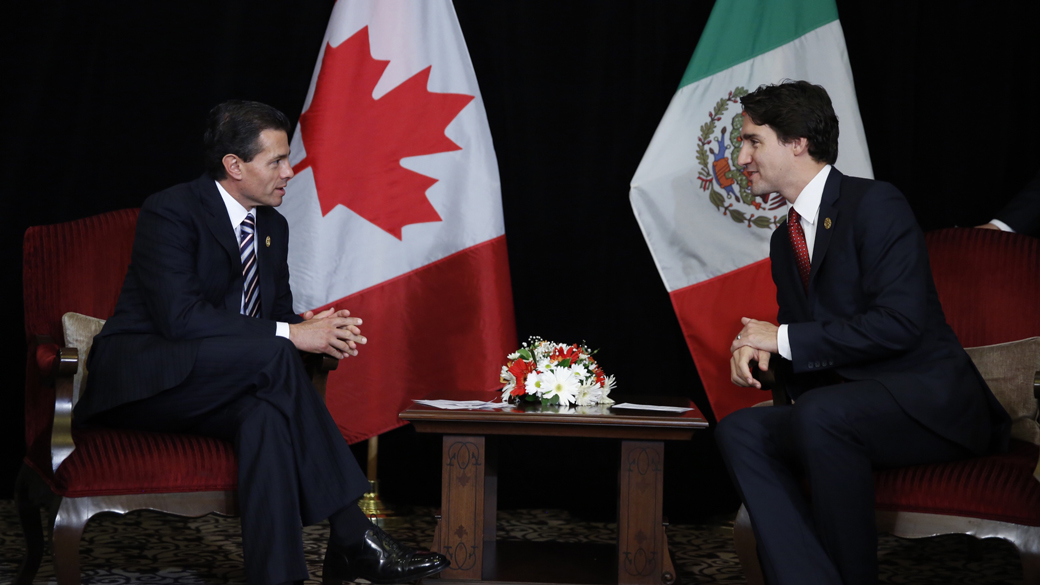Canada-Mexico Ties Ready for Next Chapter

During Canadian Prime Minister Justin Trudeau’s election campaign, a bold Liberal stance on rebuilding ties in North America distinguished him from his opponents. Singling out Mexico and committing to lifting a visa requirement for Mexicans won him admiration and friends in the South, with Mexicans once again regarding Canada as an open and welcoming friend in the region. This image is important to lure potential visitors. It is just as important to endear potential business partners.
There is good reason for such an acknowledgement of Canada’s southernmost NAFTA partner. Looked at strictly through the lens of trade in goods, two-way flow between the countries has more than quintupled over the past 20 years. Beyond movement of physical objects, the relationship goes much deeper: many of North America’s supply chains are integrated in ways that are only superficially understood, let alone valued in dollars or pesos.
Canada and Mexico also benefit from significant economic dividends as a result of tourism, student exchanges, services and foreign investment, all of which Canada is working hard to promote abroad, even in far more distant markets.
Mexico—with a population of over 120 million and a middle class bigger than Canada’s entire population—is simply too big to ignore. The trouble is, in the eyes of the public, the Canada-Mexico dynamic remains dominated by visas and tourism. This emphasis is misplaced.
Another concern is that while the bilateral relationship is largely self-sufficient and non-problematic, other, more pressing global issues top the list of foreign policy priorities. Trudeau quickly learned this during his first days in office, having had to make his foreign policy debut at the G20 summit in Turkey, only two days after the game-changing terrorist attacks in Paris. Urgent developments like climate change, the spread of terrorism or the Syrian refugees crisis are the kind of global issues that require immediate action, in contrast with the much safer and non-urgent issues in our own backyard. That does not mean they are unimportant.
It is also somewhat unhelpful that the Mexican government has so avidly hailed Canada’s commitment to lift the visa requirement as a foreign policy success. Quick wins are understandably needed for a Mexican government facing sinking approval ratings. Yet it is extremely myopic for both countries to frame their bilateral relationship solely around this issue. It is strategically misguided, superficial and it outshines the greater issues at stake.
A true win for Mexico would be a commitment by Canada to take a business delegation south led by Mr. Trudeau himself, and soon. The previous Canadian and Mexican leaders visited each other’s country only once in the last six years. With Canada’s upcoming state visit to Washington, a similar visit between Canada and Mexico would reflect the significance of the relationship.
Canadian businesses would certainly benefit from a high-level delegation to Mexico, with its usual market development efforts, CEO summits and, in particular, a much-needed boost in Canadian soft power down south.
Mexico’s energy sector, now open to foreign direct investment, has not been shy to invite Canadian business. The recent openness did not come cheaply in political capital; it needs to be followed by cash. Canada’s non-resource sectors, from automotive, banking, financial technology and education, would likely also welcome greater, more visible two-way engagement. A bold move at the top would send a positive message.
Canada should push through and realize the strategic benefits of improved ties with Mexico. With the North American Foreign Ministers Meeting taking place on Friday in Quebec City, it is an opportune time for Ottawa and Mexico City to enhance their strategic relationship and determine their bilateral and regional priorities in advance of the Leaders’ Summit later this year.
As a country in transition, Mexico faces increasingly more complex social challenges. Its southern border for instance bears the brunt of North America’s very own migrant crisis, hardly a trivial issue in terms of regional security and prosperity. Trudeau’s global acclaim for his views on gender equality, relationships with indigenous people and his Government’s action on refugees and migrants could hardly find more eager ears than in Mexico.
In other areas, Mexico is excelling. The country’s growth is paving the way to greater global engagement in issues like climate change, while Mexican firms are steadily looking to expand and invest overseas. All of this should be Canada’s business. When Mexico does well, it can only be good news for Canada.
Mexico’s president was the first head of state to congratulate Trudeau following his election victory speech. He was also the first leader to meet the Prime Minister on the margins of the G20 summit in Turkey. This shows eagerness to engage, at least from one side. It would be great for Canada to correspond with the same enthusiasm that charmed Mexicans during Trudeau’s campaign. A trade mission down south could be so much more than a break from the Ottawa cold: for a Prime Minister in search of sunny ways, it makes perfect business sense.
The views expressed here are solely those of the author.
Related posts:
Category: AMERICAS, ECONOMICS, FOREIGN POLICY & SECURITY

